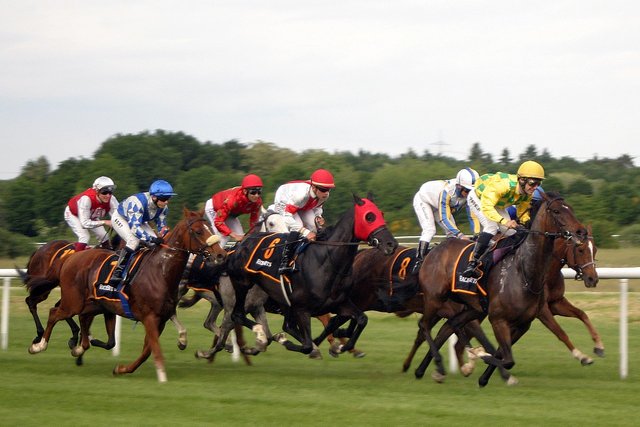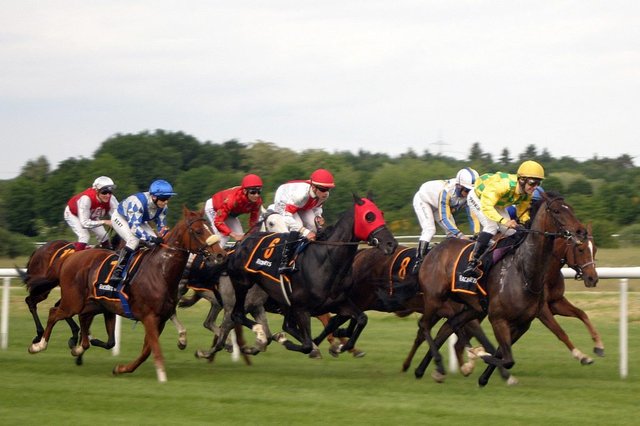
Anybody that has owned a horse or spent time in the company of these stunning animals will know that, like humans, they can feel under the weather at times, too. The symptoms are often ‘humanistic’, from coughing and a runny nose to tiredness and lethargy. And to complete the analogy, these illnesses can often be highly contagious as well.
It’s a scenario that has played out in the UK for the past couple of weeks with an outbreak of equine influenza, which has had a tremendous impact on the National Hunt racing calendar.
What is Equine Flu?
As is the case in humans, equine flu is a respiratory virus that makes the sufferer feel tired and jaded, as well as having to cope with feverish temperature changes and bouts of coughing. When you think about the nature of a racehorse, from running long distances to jumping some rather hefty fences and hurdles, clearly equine flu is a real problem for them and their trainers.

Source: Pixabay
Happily, as pointed out in this guide to racing, it is not often fatal, but in the worst case, it can lead to more significant illnesses such as pneumonia.
Usually, affected horses will be quarantined for a period of days, and once a stable has been cleared of the infection by a veterinary expert, they will be allowed to travel to racetracks once again. The difficulty is in keeping the virus under control as it can be transmitted through the air from horse to horse or indirectly through contact between horses and their handlers.
How the Story Unfolded
It was late on February 6 that the British Horseracing Authority (BHA) issued a statement confirming that there had been positive tests for three cases of equine flu in the UK. Later on, these were confirmed to have emanated from the trainer Donald McCain’s yard in Cheshire, England.
The problem is that McCain had sent a number of horses to race meetings in Ayr and Ludlow on Wednesday, and so the worry was that other horses at those courses had potentially been infected. More than 100 training yards were placed into quarantine, including those of champion trainers Nicky Henderson and Paul Nicholls.

'Nicky Henderson' by Carine06 (CC BY-SA 2.0)
Naturally, the implication for the racing industry in the UK was profound, with meetings scheduled between February 7-12 all canceled.
However, the good news was that no further cases were discovered at National Hunt yards, and racing was able to begin again on February 13.
How Bad Could the Outbreak Have Been?
Very, as the history of equine influenza outbreaks in racing confirms.
In 1979, a widespread epidemic caused a number of meetings to be canceled, and it was decided less than two years later that vaccinations against the virus would be mandatory. There was a second outbreak in the UK in 1989, but that featured horses that had not been given the vaccine; the problem in the present-day case was that vaccinated horses were still coming down with the virus.
In Australia, an outbreak in 2007 caused widespread disruption that lasted for more than four months, with the prestigious Sydney Spring Carnival canceled. A break of that duration would have huge ramifications for horse racing anywhere, so it's a huge relief for all concerned that the 2019 epidemic was managed so effectively.
Posted from my blog with SteemPress : https://www.equestrianstylist.com/equestrian-health/equine-influenza-the-virus-that-swept-through-uk-horseracing/
Hello @eqstylist! This is a friendly reminder that you have 3000 Partiko Points unclaimed in your Partiko account!
Partiko is a fast and beautiful mobile app for Steem, and it’s the most popular Steem mobile app out there! Download Partiko using the link below and login using SteemConnect to claim your 3000 Partiko points! You can easily convert them into Steem token!
https://partiko.app/referral/partiko
Downvoting a post can decrease pending rewards and make it less visible. Common reasons:
Submit